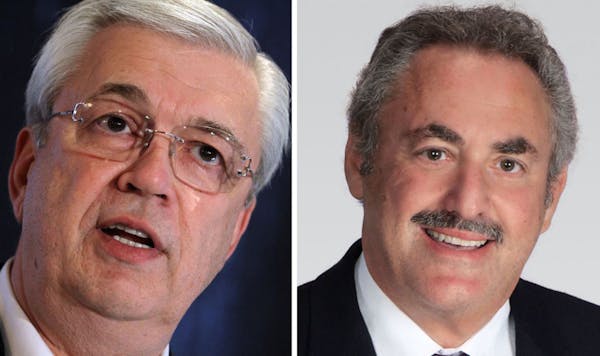In his first lengthy comments on his competition with the Vikings to bring Major League Soccer to Minnesota, Bill McGuire left open the possibility of seeking government help to build his own soccer stadium and cast doubt on whether he and the Wilf family would join together on a team.
The former UnitedHealth Group executive said he initiated talks with Vikings President Mark Wilf two years ago in an unsuccessful attempt to combine efforts before McGuire bought Minnesota United FC, a lower-level pro soccer team. He also said the owners of the Twins and Timberwolves were now providing him with unspecified help and seemed to "like the concept of what we're doing."
McGuire said he supports a separate outdoor stadium — the Vikings want the team to play in their new $1 billion enclosed football stadium — but said no location had been chosen. "If we want to be serious about soccer in our community and our state, and want to play at the highest level, [we need a] facility that is built for the game and the fans of the game," he said.
With MLS indicating it will award a franchise early next year — the league is studying bids from Las Vegas, Sacramento, Calif., and Minneapolis — McGuire's comments came as the Vikings seemed to be gaining momentum by unveiling how their stadium, set to open in 2016, would be reconfigured for soccer and lobbying local soccer enthusiasts for support. The Vikings have an exclusive five-year window at the stadium to lure a MLS franchise.
McGuire also spoke directly on possible public subsidies he might want for a soccer-only stadium — a touchy political point given the recent controversies over the successful pushes for public money for the Twins' Target Field and the new Vikings stadium.
"We'll see when we confirm in our own minds the where's and why's of all of that. And depending, who knows? We haven't asked [yet for public money]. I mean, there's no formal 'ask' out there," he said.
Politicians wary
However, McGuire could face an uphill climb. Gov. Mark Dayton, Minneapolis Mayor Betsy Hodges and Minneapolis City Council President Barb Johnson have been critical of starting another stadium debate involving public subsidies.
But McGuire confirmed he had spoken to Mike Opat, the Hennepin County board chair who is supporting McGuire's soccer plans and said he prefers a soccer-only stadium near Target Field. Opat was instrumental in securing public money for the Twins ballpark. "Obviously, we've talked to him, and he knows our thinking about soccer," McGuire said.
The high-stakes competition for an MLS team involving some of Minnesota's wealthiest sports team owners has complicated a bidding process many initially thought the Vikings were well-positioned for. "It didn't occur to us that there were going to be other folks trying to do the same thing," said former Rep. Morrie Lanning, R-Moorhead, the lead House author on the Vikings stadium legislation in 2012 that gave the Wilfs exclusive rights to bring a MLS team to the facility. "I bet that hit the Wilfs by surprise."
In addressing his group's relatively low public profile, McGuire said this week that "participating in hypothetical debates in the media doesn't enhance" his overall efforts. While he acknowledged that MLS' timetable for awarding its next expansion franchise "obviously influences some of what we do," McGuire was vague on when details of his plan would be made public. "I don't know — I think when we decide that it is appropriate and feasible," he said.
Wilfs approached
McGuire's comments came as new details emerged about his purchase in November 2012 of Minnesota United FC — the team then known as the Minnesota Stars — and of attempts made to also get the Vikings interested in the team.
David Downs, then the commissioner of the North American Soccer League, which owned the troubled team, said he contacted the Vikings about buying it before turning to McGuire. The Vikings "showed no interest in doing a deal," he said. Downs said he contacted the Vikings in August 2012, shortly after the Wilfs won legislative approval for a new football stadium, and added that other franchises similar to United had morphed into more desirable MLS teams.
Downs said he came away from the brief discussions with questions on the Vikings' commitment to soccer. "At the time I was worried that [the Vikings' interest in soccer] was — and it appears it may have been — 'How do we fill this building [with tenants]?' And not necessarily because of a genuine interest" in the sport, Downs said.
Vikings spokesman Lester Bagley confirmed the discussions but said the Vikings' lack of interest was not because the team did not care about soccer. "The timing was not right," he said. He said the Vikings, fresh off their legislative victory, had the "state's largest construction project staring us in the face."
Bagley said McGuire offered the Wilfs a minority ownership stake in United, and that the Vikings preferred directly bidding for a MLS franchise. "There are certainly different paths to get to MLS, and we're comfortable with the route that we've taken," he said.
Downs said he then tried a totally different approach: He asked his daughter, a student at Amherst College, to reach out to her college roommate — McGuire's daughter — to see if McGuire would be interested in buying the troubled team.
McGuire agreed, but before making the purchase he said he phoned the Vikings. "Before I pulled the trigger, [I] asked them if they had any interest in going in together," he said. "They said no." He said he has had little, if any, contact with the Vikings since then. "I'm not sure I've personally ever met [the Wilfs]," he said. "I certainly haven't spent any time with them."
McGuire also expressed reservations that both sides would ultimately join together. "I've not been contacted to that end. I had my one foray in the beginning, and I didn't hear any level of interest," he said. "They're working on something else."
But "we have our views about the best way to present the sport. [We] think that is outdoors. We think that's on grass," he said.
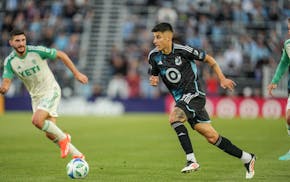
Minnesota United and Austin play to a 1-1 draw at Allianz Field
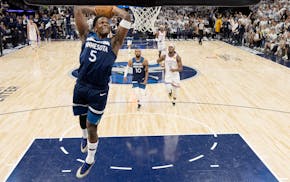
Souhan: Edwards shows clearly the worth of basketball's key skill — jump shooting
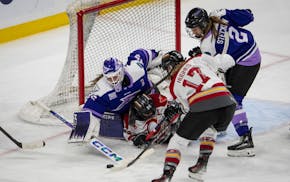
Neal: Frost goaltender Maddie Rooney stands tall — and stands up for her teammates on defense
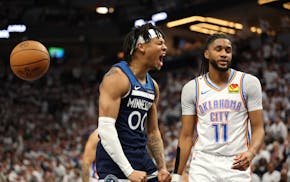
Timberwolves takeaways from Game 3: The game had barely begun and the Thunder was done

